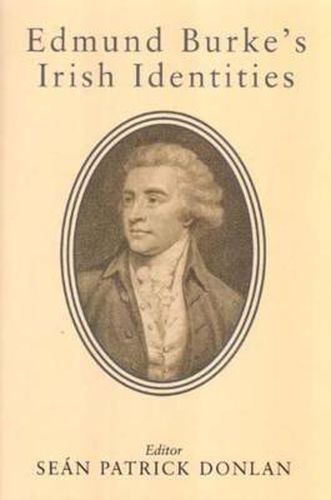Readings Newsletter
Become a Readings Member to make your shopping experience even easier.
Sign in or sign up for free!
You’re not far away from qualifying for FREE standard shipping within Australia
You’ve qualified for FREE standard shipping within Australia
The cart is loading…






Edmund Burke (c.1729-1797), orator, philosophical and political writer, British statesman, and opponent of the revolution in France, was among the most famous of eighteenth century Irishmen. Two centuries after his death, however, his legacy is still contested, both in Ireland and abroad. This is the first collection of essays to focus exclusively on Burke’s complex relationship to his native Ireland. The book brings together thirteen authors, both established experts and young scholars, from a wide variety of viewpoints and disciplines. The contributors discuss Burke’s early years in the Blackwater Valley and in Ballitore, his experiences at the University of Dublin and as a Dublin journalist, his relationship to Irish history and aesthetics, his friendship with fellow Irishman Oliver Goldsmith, his numerous Irish links after he began his parliamentary career, his views on Irish politics and the Irish constitution, his thoughts on Ireland and India, the idea of union and political economy, religion and the Irish reception to his anti-revolutionary writings. The contents include: Michael Brown: The National Identity of Edmund Burke; Helen Burke: Speaking from behind the Scenes: Edmund Burke and the Lucasians, 1748-49; L.M. Cullen: Edmund Burke and Trinity College: Lifetime ties and later College commemoration; Sean Patrick Donlan: The ‘genuine voice of its records and monuments’: Edmund Burke’s ‘interior history of Ireland’; Michael J. Griffin: Burke, Goldsmith, and the Irish Absentees; Daire Keogh: Thomas Hussey, Edmund Burke and the Irish Directory; Elizabeth Lambert: Burke’s Irish Connections in England; F.P. Lock: Burke, Ireland, and India: Reason, Rhetoric, and Empire; and Bill McCormack: Edmund Burke, Yeats and Leo Frobenius: ‘The State a tree’. It also includes: Katherine O'Donnell: ‘To Love the little Platoon’: Edmund Burke’s Jacobite Heritage; Eamon O'Flaherty: Burke and the Irish constitution; Tadhg O'Sullivan: Burke, Ireland and the counter-revolution, 1791-1801; and Nathan Wallace: Edmund Burke’s Anglo-Irish Double Vision in Thoughts on the Cause of the Present Discontents.
$9.00 standard shipping within Australia
FREE standard shipping within Australia for orders over $100.00
Express & International shipping calculated at checkout
Edmund Burke (c.1729-1797), orator, philosophical and political writer, British statesman, and opponent of the revolution in France, was among the most famous of eighteenth century Irishmen. Two centuries after his death, however, his legacy is still contested, both in Ireland and abroad. This is the first collection of essays to focus exclusively on Burke’s complex relationship to his native Ireland. The book brings together thirteen authors, both established experts and young scholars, from a wide variety of viewpoints and disciplines. The contributors discuss Burke’s early years in the Blackwater Valley and in Ballitore, his experiences at the University of Dublin and as a Dublin journalist, his relationship to Irish history and aesthetics, his friendship with fellow Irishman Oliver Goldsmith, his numerous Irish links after he began his parliamentary career, his views on Irish politics and the Irish constitution, his thoughts on Ireland and India, the idea of union and political economy, religion and the Irish reception to his anti-revolutionary writings. The contents include: Michael Brown: The National Identity of Edmund Burke; Helen Burke: Speaking from behind the Scenes: Edmund Burke and the Lucasians, 1748-49; L.M. Cullen: Edmund Burke and Trinity College: Lifetime ties and later College commemoration; Sean Patrick Donlan: The ‘genuine voice of its records and monuments’: Edmund Burke’s ‘interior history of Ireland’; Michael J. Griffin: Burke, Goldsmith, and the Irish Absentees; Daire Keogh: Thomas Hussey, Edmund Burke and the Irish Directory; Elizabeth Lambert: Burke’s Irish Connections in England; F.P. Lock: Burke, Ireland, and India: Reason, Rhetoric, and Empire; and Bill McCormack: Edmund Burke, Yeats and Leo Frobenius: ‘The State a tree’. It also includes: Katherine O'Donnell: ‘To Love the little Platoon’: Edmund Burke’s Jacobite Heritage; Eamon O'Flaherty: Burke and the Irish constitution; Tadhg O'Sullivan: Burke, Ireland and the counter-revolution, 1791-1801; and Nathan Wallace: Edmund Burke’s Anglo-Irish Double Vision in Thoughts on the Cause of the Present Discontents.